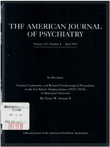Day care for early preschool children: implications for the child and family. American Psychiatric Association Task Force on Day Care for Pre- School Children
Abstract
The use of nonparental day care for children has increased over the past several decades and mirrors changes in the social and economic fabric of the United States. In the case of the early preschool child, precise understanding of the implications of day care for later development remains elusive. Of equal concern are the implications of early preschool day care for the family unit and especially the mother. What constitutes appropriate, safe, and affordable day care has been debated. The impact of poor care is demonstrable for both the child and family. Quality day care offers the potential for positive psychological development of the child and the family. The research related to day care for young children has expanded our knowledge of child development, but it also highlights a need for expanded research using refined measures of psychological growth and child-parent interaction. This report was approved by the APA Board of Trustees in December 1992.
Access content
To read the fulltext, please use one of the options below to sign in or purchase access.- Personal login
- Institutional Login
- Sign in via OpenAthens
- Register for access
-
Please login/register if you wish to pair your device and check access availability.
Not a subscriber?
PsychiatryOnline subscription options offer access to the DSM-5 library, books, journals, CME, and patient resources. This all-in-one virtual library provides psychiatrists and mental health professionals with key resources for diagnosis, treatment, research, and professional development.
Need more help? PsychiatryOnline Customer Service may be reached by emailing [email protected] or by calling 800-368-5777 (in the U.S.) or 703-907-7322 (outside the U.S.).



